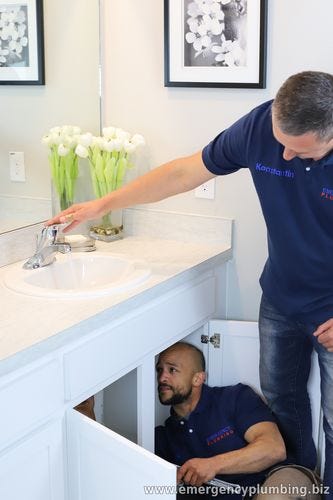Crucial Bathroom Plumbing Insights for First-Time Homeowners
Crucial Bathroom Plumbing Insights for First-Time Homeowners
Blog Article
We have found this post relating to Essential DIY Bathroom Plumbing Tips Every Homeowner directly below on the web and figured it made perfect sense to talk about it with you here.

For brand-new home owners, understanding and preserving shower room pipes can conserve both time and money by stopping costly issues down the line. Here are some important restroom plumbing tips to help you keep whatever running efficiently.
Acquaint Yourself with the Main Shut-Off Valve
Knowing where the main water shut-off shutoff is located in your house is crucial. This permits you to quickly switch off the water supply in case of major leaks or throughout pipes emergencies, avoiding comprehensive water damage.
Regularly Evaluate for Leakages
Little leaks can lead to large troubles. Consistently examine under sinks, around bathrooms, and near pipes fixtures for any indicators of leaks. Try to find moisture, small drips, or corrosion. Capturing and repairing leakages early can prevent more serious damages and conserve water.
Don't Ignore Slow Drains Pipes
If your sink or bath tub is draining slowly, it's often an indicator of a blockage developing. Addressing this very early can stop a complete clog. Utilize a plunger or a plumber's serpent to clean out debris. Stay clear of utilizing chemical drain cleansers as they can damage your pipelines gradually.
Know What Not to Flush
Toilets are not waste disposal unit. Prevent flushing anything aside from toilet tissue and human waste. Things like wipes, womanly hygiene items, and cotton swabs must be disposed of in the garbage to prevent obstructions and sewer back-ups.
Install Strainers in Drains
Area strainers in your sink and bath tub drains to capture hair and other particles before they enter your pipes system. Cleaning the strainers consistently will assist protect against accumulation and maintain water streaming openly.
Maintain Your Hot Water Heater
Guarantee your water heater is readied to an appropriate temperature level (generally about 120 levels Fahrenheit) to avoid hot and reduce energy use. Flush the tank every year to get rid of sediment accumulation, which can lower the efficiency and life-span of your heater.
Upgrade Your Fixtures
If your home has older components, consider upgrading to extra efficient designs. Modern commodes, showerheads, and taps are made to use less water while giving good pressure, which can significantly lower your water expense and environmental impact.
Beware with Do It Yourself Pipes Repairs
While it's appealing to handle all home repair services on your own, beware with plumbing. Some issues might call for professional know-how, particularly if they involve primary water lines or drain repairs. Employing an expert can occasionally be extra cost-effective than DIY, particularly if it stops more damage.
Prepare for Cold Weather
Protect your pipes from freezing during cold weather by insulating pipes in unheated areas like basements, attic rooms, and garages. During extreme cold, allow cold water drip from taps offered by subjected pipes to help prevent cold.
Arrange Routine Maintenance
Consider scheduling yearly examinations with a qualified plumbing professional. They can identify issues that you might miss, such as covert leakages or damage on pipelines and fixtures. Routine maintenance helps extend the life of your pipes system and can protect against emergency situations.
Final thought
Understanding and maintaining your home's bathroom pipes can protect against several typical issues. By adhering to these essential tips, you can guarantee your shower room stays functional and reliable, saving you time and money in the future.
Essential Plumbing Tips for Homeowners: Keep Your Pipes Flowing Smoothly
As a homeowner, understanding the basics of your plumbing system can save you time, money, and a lot of headaches. Plumbing issues can range from minor annoyances like dripping faucets to major problems like burst pipes that cause significant damage. This guide provides essential tips to help you maintain your plumbing system and tackle common issues.
Understanding Your Plumbing System
Supply System: Brings fresh water into your home from a municipal source or a well. Drain-Waste-Vent System: Removes wastewater and vents sewer gases outside. Fixtures and Appliances: Includes sinks, toilets, showers, dishwashers, and washing machines. Basic Maintenance Tips
Regular Inspections: Periodically check for leaks, corrosion, and other signs of wear and tear. Look under sinks, around toilets, and near water heaters. Know Your Main Shut-Off Valve: In case of a major leak, you’ll need to shut off the water quickly. Ensure everyone in your household knows where the main shut-off valve is located. Prevent Frozen Pipes: In cold climates, insulate exposed pipes and let faucets drip during extreme cold to prevent freezing. Use Strainers: Install strainers in sinks and tubs to catch hair, food particles, and other debris that can cause clogs. Common Plumbing Issues and Solutions
Clogged Drains:
Prevention: Avoid pouring grease down the drain and use drain screens to catch debris. DIY Fix: Use a plunger or a plumbing snake to clear minor clogs. For stubborn clogs, a mixture of baking soda and vinegar can sometimes help. Leaky Faucets:
Prevention: Replace washers and seals regularly. DIY Fix: Turn off the water supply, disassemble the faucet, and replace worn parts.

Book Instantly Report this page